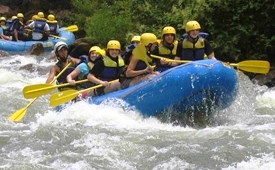Whitewater on the Cherokee National Forest

Capture the splendor and excitement of canoeing, kayaking or rafting whitewater rivers in the Cherokee National Forest. Each river has its own personality, with diverse paddling challenges and outstanding scenery.
• Ocoee River: Class III-IV rapids. This river was home of the 1996 Olympic canoe and kayak slalom events. Outfitters provide rafting services on both the upper and lower sections. (Ocoee River Zone)
• Hiwassee River: Class I-III rapids. Local outfitters rent rafts and tubes. (Hiwassee River Zone)
• Tellico River: Class II-IV rapids, best paddled in the spring or times of the year when there is adequate rainfall. (Tellico River Zone)
• Pigeon River: Class I-IV rapids. Local outfitters provide rafting services. (Pigeon River Zone)
• French Broad River: Class I-III rapids. A popular commercial section runs 13 miles from Hot Springs, North Carolina, to Del Rio, Tennessee, with local rafting services. (French Broad River Zone)
• Nolichucky River: Class II-V rapids through remote backcountry in the Pisgah and Cherokee national forests and Class I-II rapids between Erwin, Tennessee, and Davy Crockett Lake near Greeneville, Tenn. Commercial rafting is available on the challenging 8.5-mile section between Poplar, N.C. and Erwin. (Unaka Mountain Zone, Bald Mountain Zone)
For information about these rivers and their difficulty levels, see www.americanwhitewater.org.
The water flow of some of these rivers is controlled by the Tennessee Valley Authority. Check TVA’s water release schedules at www.tva.gov.
To make your trip more enjoyable and safe, remember these tips. If you are planning a guided trip or renting equipment, call ahead for reservations. Heaviest recreation use occurs late spring through mid summer.
On the day of your trip, let someone know your itinerary. Wear appropriate safety gear, including flotation device and helmet. If you are a novice, paddle with experienced boaters or guides who know the river and are trained in whitewater safety.
Alerts & Warnings
- Turtletown Falls Trail temporarily closed
- Rhododendron Trail closed
- Lost Creek Construction
- Access disrupted on forest service roads on the Ocoee Ranger District
- Road to Beauty Spot Scenic Overlook (aka Indian Grave Gap) closed
- Watauga Ranger District Office closed for renovations
- Bald River Falls Bridge replacement project

